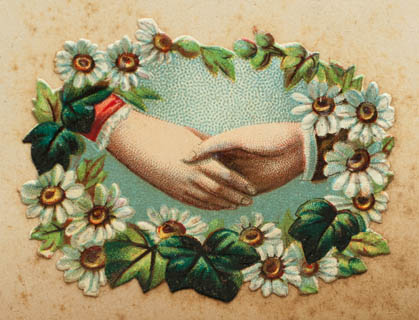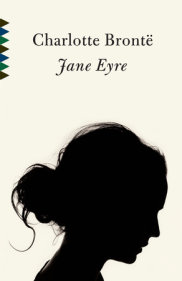![]() Valentine's Day Series - Part 1
Valentine's Day Series - Part 1
My Five Favourite Books about
Unrequited Love

1890s scrapbook image courtesy Jan N.
‘Unrequited love hurts like hell – whether you’re fifteen or fifty-something.’
That’s the tagline from my forthcoming novel, 'A Place of Her Own'. And it’s true, isn’t it? There’s no age limit on the emotional pain involved in loving someone who doesn’t love you in return.
Whether it’s a teenager experiencing her first love or a ‘woman of a certain age’ yearning for someone she can’t have, I’ve always thought there’s something noble about a love that’s unspoken and full of longing. Most of us have experienced it, even if it was only a fleeting adolescent crush on someone who didn't even know we existed.
In 'A Place of Her Own', a woman suffering from unrequited love comes to the following conclusion:
‘In a romantic sense, he might be spoken for, but that didn’t matter. She could love someone who didn’t love her in return. There was no law against it. In fact, people did it all the time. He would never have to know. She just needed to keep things in perspective, avoid wallowing in the unrequited nature of her feelings.’
Then there’s the dysfunctional scenario, the one where unrequited love morphs into an obsession. If a person happens to be psychologically unbalanced, an obsessive passion can lead to extreme behaviour. Ian McEwan writes chillingly about aspects of this phenomenon in his novel, ‘Enduring Love’.
But back to the concept of unrequited love as a romantic infatuation which is never acted on. The nineteenth century English poet, William Blake summed it up in these two famous lines:
‘Never seek to tell thy love,
Love that never told can be.’
So, without further ado, here are my five favourite books about unrequited love. By the way, there are spoiler alerts in the text for those of you who haven't read 'The Great Gatsby', 'Young Werther' and 'Jane Eyre'.
1. NOTRE DAME DE PARIS, Victor Hugo
When I was a teenager, I used to stay back after school every Wednesday afternoon to attend film club. That’s how I came to see the 1930s version of ‘The Hunchback of Notre Dame’. I loved Charles Laughton’s gargoyle-like Quasimodo, desperately in love with Maureen O’Hara’s beautiful Esmeralda. Anxious to linger over the story, I bought the book itself, a ponderous tome with multiple sub-plots and a great deal of extraneous historical material that I skimmed relentlessly in my search for the passages about Quasimodo’s heroic infatuation with the Gypsy girl and its counterpoint, the dastardly Claude Frollo’s obsession with her.
2. LE GRAND MEAULNES, Alain-Fournier
I would never have known about this wonderfully evocative novel, if it hadn’t been a set text in my first year French course at uni. That’s usually enough to put you off a book, particularly when there’s an essay involved, but I quickly fell in love with Alain-Fournier’s dreamlike story about a young man called Meaulnes, trying to recapture a lost past in which he met a girl who stole his heart.
In that respect, there are similarities to ‘The Great Gatsby’ (discussed below). However the two novels differ markedly in mood and tone. Fitzgerald’s story, set in the Jazz Age, is often dark and cynical, while ‘Le Grand Meaulnes’ reflects the comparatively innocence of the pre-World War I period in which it was written. For me, there’s an added poignancy in that its young author was killed in action on the Western Front not long after the book was published. It was his first and only novel. If he had lived, he might well have been one of the great novelists of the twentieth century.
3. THE GREAT GATSBY, F. Scott Fitzgerald
I have a confession to make – I own two copies of ‘The Great Gatsby’ – one in the city, the other in our little country cottage. I love this book so much that I reread it at least once a year. In essence, it's a tale of a man who builds a whole life around the idealised love story he has concocted in his head. (Spoiler Alert) For a while, the fantasy seems to become a reality, but this isn’t the world of ‘The Notebook’, and things don’t end well. Poor Gatsby. He never realised he was trying to recapture an epic romance that didn’t exist in the first place.
4. THE SORROWS OF YOUNG WERTHER, Goethe
‘Die Leiden des jungen Werthers’ is yet another set text from my first year at university. It’s a classic tale of unrequited and overwrought love, but unlike ‘Le Grand Meaulnes’, (Spoiler alert) there’s a particularly nasty ending for the long-suffering Werther. Goethe later disowned the book, which contained embarrassing autobiographical elements inspired by his own youthful infatuation with a young woman. The novel became influential among young men of the time –a kind of 1770s’ equivalent of ‘Catcher in the Rye'.
5. JANE EYRE, Charlotte Brontë
(Spoiler alert)
Wait a minute, I can hear you say, didn’t Jane Eyre marry Mr Rochester in 
Well, yes, she did, but only after his house burned down and he was blinded in the fire. For a large part of the novel, during which Jane served as governess to Mr Rochester’s ward, she was in love with her boss while he manipulated her emotionally by carrying on with the aristocratic and wealthy Blanche Ingram. It’s an odd book when you analyse it, but if you just go with the flow, it can be an engrossing Gothic read.
See also: My Four Favourite Stories about Platonic Love and My Top Ten Romantic Comedies.
Deborah O’Brien
January 26, 2014
Have I ever bought a book on the basis of its cover? Absolutely. In fact, a gorgeous cover will always grab me. Erin Morgenstern’s THE NIGHT CIRCUS is just one such instance - I couldn’t resist its silhouetted Victorian figures, silver stars and embossed lettering. It turned out that the cover captured the spirit of the book brilliantly and I've never regretted that impulse buy.
Another example is Alan Bennett’s THE UNCOMMON READER. I fell for this little book the minute I saw its white and gold dust jacket emblazoned with a raised gold crown (yes, I do like tactile covers). Admittedly, my purchase was influenced by the author's name. But, most of all, I loved the title.
Which leads me to the real subject of this article – just how important are titles in ‘hooking’ a potential reader? Those of you who are regular visitors to my blog will know that I’ve discussed this in an earlier article, and I still feel the same way. A great title is paramount.
As a writer, I can’t settle into my manuscript until I have the perfect name for it. During the first few weeks in the gestation of MR CHEN'S EMPORIUM, the book was known by another name, a perfectly acceptable one, but unspectacular nonetheless. When the right title came to me, I knew instantly that it was ‘the one’. And after the title was firmly in place, gracing the first page and the footer, I felt free to get on with the story.
In the case of THE JADE WIDOW, I had the name months before I started writing the book. Actually, I suspect that was one reason why the writing went so smoothly. As for my forthcoming novel, A PLACE OF HER OWN, I have a confession to make. Over the past three years there has been a series of working titles, none of which ever fully satisfied me. At one stage my husband asked, ‘What are you calling it this week?’ Finally I resorted to dubbing it ‘Number 3’. Oh dear.
So I went back to basics. What is my book about, I asked myself. The answer came easily. It’s about finding a safe place, a refuge, a bolthole. And suddenly I knew the word ‘place’ had to be in the title because it has so many levels of meaning.
First and foremost, there’s the physical sense of the word. A real location. For my female protagonist, Angie Wallace, it's a charming Victorian house with high gables, fancy bargeboards and dormer windows, surrounded by rolling lawns and a lavender garden. She has a very personal investment in this place, having renovated it herself. And she has developed a special bond with one of its nineteenth-century inhabitants, a young woman by the name of Amy Duncan Chen, who suffered the sudden loss of her husband, just as Angie did more than a century later.
Then there are the psychological connotations of the word 'place', the sense of ‘being in a good place’ emotionally, or its converse, being 'all over the place'. Angie Wallace experiences both states of mind but I won't say any more for fear of giving away too much.
A PLACE OF HER OWN will be released by Random House Australia on May 1. By the way, you don't need to have read MR CHEN to pick up the story. Although this book features characters from the modern-day thread of MR CHEN'S EMPORIUM, it's most definitely a stand-alone novel.
Deborah O’Brien
January 2014

As as a child, I couldn't wait for Christmas to come; now I wish December had five weeks, instead of four. If there really was an extra week, I might find the time to cook some of those wonderful baked goods, jams and chutneys, featured in the Christmas issues of the 'Australian Women's Weekly' and 'Better Homes and Gardens'.
This year I have a pretty good excuse for the dearth of handmade delicacies - I'm deep into the edit of A PLACE OF HER OWN with the dreaded deadline looming just before Christmas. So if I don't send out Christmas cards this year, I hope my friends will understand.
But the one thing I always make time for is decorating the house. My family calls me 'Mrs Christmas' - I have a cupboard full of ornaments and Christmas bric-a-brac collected over the years, many of them handcrafted by talented friends. You can see some of their work in last year's pics. And here are some glimpses of Christmas at our place in 2013.



Wishing you all a joyful Christmas and a happy, healthy and fulfilling 2014!
Deborah

My kelpie dog, Angel, is almost eight months old. In human terms, I suppose you'd call it toddlerhood. One minute she's well behaved, sitting and lying down on command; the next she's ripping out plants and tearing the flyscreen on the back door into shreds. Yes, I know things will get better. Other kelpie owners assure me that it's simply a matter of maturation. I'll keep you posted.
In the meantime, here's her life so far - in pictures.





Deborah O’Brien
November 27, 2013
What’s Next ? 'A Place of Her Own'

Writing a novel is a solitary, deeply personal process. You sit at your laptop for months, tapping out the story. Even when you shut down your computer at night, the book continues to fill your thoughts and inhabit your dreams. Its characters become as close to you as your dearest friends. And speaking of friends, you don't see much of them because you only have time for the imaginary ones. In effect, you’ve become a hermit hidden away in your writing cave, obsessed by the make-believe world you're building word by word, sentence by sentence.
So it’s a relief when you finish the final draft and hand it over to your publisher. Yet it’s also extremely daunting. You wait with bated breath for the feedback. You check your emails incessantly. When the much anticipated response arrives in your inbox, your heart rate escalates towards tachycardia. Then you exhale with relief when the message says, ‘I couldn’t put it down’.
But even though the book has passed its first test, that doesn’t mean it won’t need improving. There will be structural revisions to complete, plotholes and psychological gaps to fill, inconsistencies to remedy, lazy language to polish. That’s the stage we’re at with my next novel, A PLACE OF HER OWN.
The ‘her’ in the title refers to the two female protagonists, Angie Wallace and Diana Goodmann. And the ‘place’ they are seeking is a safe haven - in both a physical and a psychological sense. I started writing this book immediately after I finished MR CHEN’S EMPORIUM – that was in 2010 and I’ve been working on it, periodically, ever since. Those of you who’ve read my books will know I tend to write ‘heartwarming’ stories, and there are certainly many heartwarming elements in this novel, but also some dark moments. Very dark.
The story is set in modern-day Millbrooke and focuses on Angie and her ambivalent relationship with Richard Scott. In MR CHEN’S EMPORIUM he was a rather mysterious character. Many readers told me they’d like to know more about him. Well, you'll find out all his secrets in A PLACE OF HER OWN. Technically it’s a modern-day sequel to MR CHEN, the final book in the 'Emporium trilogy', but the story stands on its own with its contemporary setting and themes.
The ladies referred to in the title, Angie and Diana, are both ‘women of a certain age’, however in all other respects they are very different people. Angie has established herself as a valued member of the local community. Diana arrives in town like a lone gunslinger on a mission. Her target? None other than Richard Scott. It’s a long story full of twists and turns.
A PLACE OF HER OWN will be released in May 2014.
Deborah O’Brien
November 2013
Subcategories
Home in the Highlands
Home in the Highlands blogs
